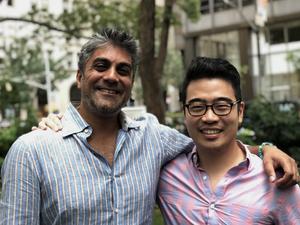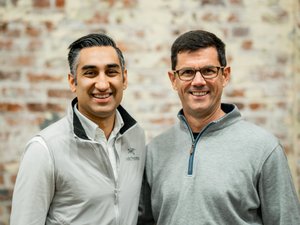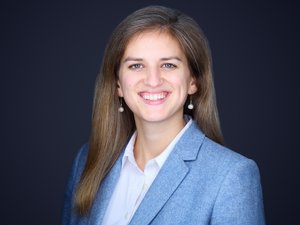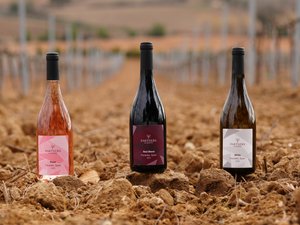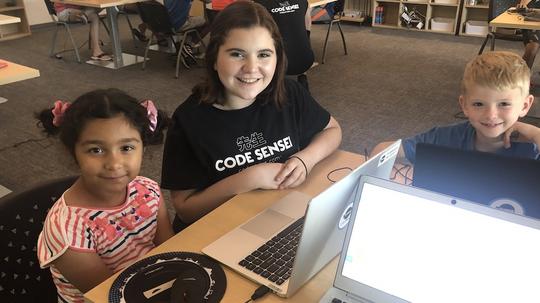
In this Q&A, Charlotte Inno talks with Anjali Dighe, CEO of Liquid Metal Solutions and owner of the Code Ninjas coding schools in Concord and Ballantyne (with Myers Park and Chapel Hill locations forthcoming). Those two locations represent a network of nationwide Code Ninjas schools, where interested students learn how to, well, code.
Below, Dighe explains a bit about the program, curriculum and her role as owner.
Editor's Note: Responses have been lightly edited for length, style and clarity.
Charlotte Inno: For those who are coming into Code Ninjas totally blind, what is it? Who does it aim to serve? Dighe: Code Ninjas provides our students, ages 8 to 15, a unique resource to enhance problem solving, critical thinking, mathematical and logic skills, through creating and building games by learning how to code. These lifelong skills give our students a unique outlet to use screen time in a productive and useful manner. During the course of our three- to four-year program, our students will have learned three different programming languages, will have built an app using those languages and will learn how to take that app to market.

CI: When was the company established, and by whom? Why? Dighe: Code Ninjas is the nation’s largest and fastest-growing kids coding franchise. We (Anjali and Vivek Dighe) joined Code Ninjas as its first franchisees in 2017. Our first center opened in Concord in February 2018, and our second center opened in Ballantyne in October 2018. We moved to Charlotte from Northern Virginia in the fall of 2016. As we started looking for companies to purchase, we came across the Code Ninjas franchise. Realizing that most schools still taught very traditional subjects, we decided to become a disrupter in the educational community by providing this necessary resource to the Charlotte metro area. We wanted to build a foundation on which our next generation of leaders could be successful.
Children today are exposed to technology at a very young age. From smartphones to tablets to laptops to gaming devices, they have become familiar with the install, the set-up, and the use of applications—even if they don’t realize it. They have a passion to learn how to expand their knowledge and are turning to places like YouTube or online programs to gain information; however, they are not learning in a methodical way that gives them a good foundation to build off of.
The reality of our education system today, across the nation, is that it is not set up for everyone to participate in the new American economy and the opportunities that go alongside that opportunity. Computer science is not widely taught in our schools. Gallup recently surveyed parents and school administrators, and nine out of 10 parents surveyed wanted their child to learn computer science. In that same survey, school principals and superintendents told us that fewer than half of those schools offer computer science classes.

CI: What services does the program provide? Dighe: Our students come to our locations two hours per week based on their schedule year-round. They self-pace through our curriculum in a community-based environment, allowing for collaboration, communication and the sharing of thought-based problem-solving skills.
Our curriculum is built on the "belts," similar to the martial arts, starting with the white belt and moving up to the black belt. Our staff is made up of high school and university students who have at least a language under their belt. Their role is to help our students solve problems as they come across questions around the curriculum.
In addition, we actively seek speakers to motivate and inspire our students. Thus far, we have brought in speakers from the FBI, a race car designer, and the chief creative officer of a large gaming company. We also look for partnerships to run field trips. This year, we had a field trip to the Charlotte Douglas Airport, where our students met with the canine teams, the explosives teams, TSA, and the airport fire department. We also had a field trip to Concord Regional Airport, where students met with TSA and the Civil Air Patrol and toured the air traffic control tower.
CI: How does Code Ninjas measure success? Dighe: We identify success in multiple ways. First and foremost is to see that our students are learning how to code and that they are building a foundation by which they understand how code works. In professionally developing our young staff, we look to mentor, motivate, inspire and educate our students.
Coding can be hard. How do we encourage and build confidence in our young students to stay in our program, even though they are learning material that currently high school and university students are learning? Working with 8-year-olds on learning about the x-y coordinates and angles in order to code their character to move across a screen is a success. Working with an autistic child to collaborate is a success. Turning a student into a staff member because they have finished learning a language and have turned 16 and love code is a success.

CI: What is unique about the Charlotte Code Ninjas program, as opposed to other locations? Dighe: With the increasing impact of technology in nearly every sector of the global business environment, coding has become a necessary language and skill set in the digital age. Our curriculum is what sets Code Ninjas apart from the rest. As opposed to going a mile wide with a lot of different opportunities around STEM, we go a mile deep. We have a path that gives our students real, tangible results with hard work and determination. Like learning an instrument or a language, it takes time. To go through our program, a student dedicates three to four years. Our parents understand this as well. That is why we have worked so hard to create more than a company, but rather a community of like-minded individuals who are working towards similar goals and are willing to share and help one another as they work though problems.
CI: Why Code Ninjas and not some other educational programs? Dighe: There are no other educational programs in the Charlotte area like this. Elementary schools may touch on code through block-based programming during "Hour of Code" in November, but there is no follow-on once they have introduced students to code. Many STEM schools also touch on code, but stay on block-based code. In middle school, there are no coding classes, as the resources and curricula are scarce. And once a student has reached high school, more than likely, computer programming is an elective course with limited classroom space.
Our drive is to seek to partner with other educational programs and not compete with them. How do we continue to grow our next generation of leaders with skills that they will have to have? Everyone in the tech community knows and understands how the job market will continue to grow in this field. We do not have enough resources to prepare our children at an early enough age. The question is, how do we continue to drive the conversation about teaching our kids at a younger age [and give them] the skills that are necessary for their successes?

CI: How did you get involved in Code Ninjas? What is your official title? Dighe: We are franchise owners of the Charlotte and Chapel Hill markets. With two locations open in 2018, we hope to open the other two locations over the next two years. As "Franchisee of the Year" in 2018, and with Concord winning the "Black Belt Center of the Year" award (along with four other locations in 2018), we are deeply involved in the growth, support and mentorship to Code Ninjas owners nationwide.

CI: Tell me a little bit about your entrepreneurship journey. Dighe: I hold a bachelors of arts in political science from North Carolina State University. I'm a graduate of the Voyagers Program Class of 2014 through ACT-IAC, the Leadership Fairfax Class of 2010;, The Emerging Leaders Institute Class of 2003 and the Georgetown International Executive MBA Program Class of 1998. I'm head of the Code Ninjas Franchise Advisory Council and co-director of the Women in Homeland Security’s STEM Committee, and I sit on the Board of Fleurix.
Vivek currently volunteers his time on the Cox Mill High Schools Academy of Information Technology Advisory Board and is an active member of the Charlotte InfraGard and the Charlotte Regional Alliance. He holds a bachelor of science in computer science from the University of North Carolina at Charlotte.
